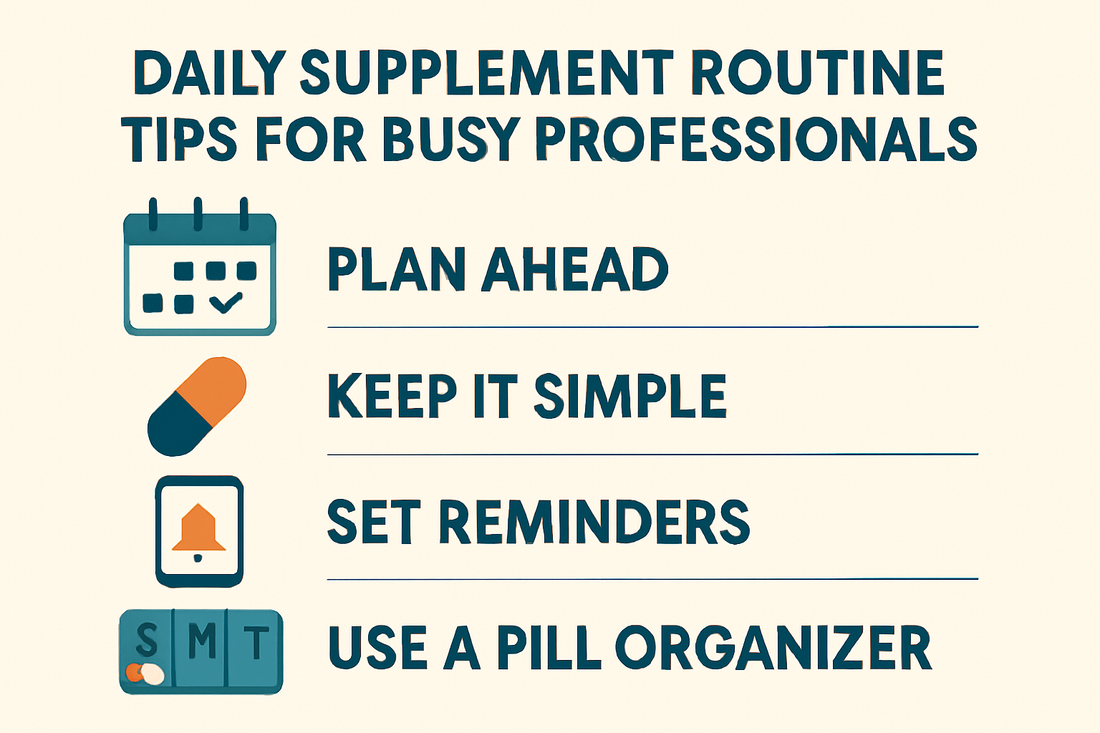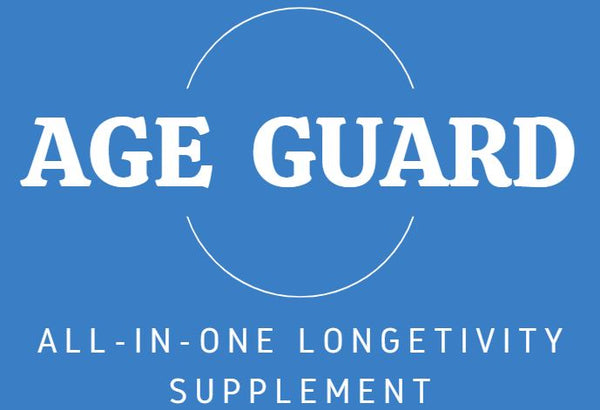
Daily Supplement Routine - Tips for Busy Professionals
Share
The Physiological Demands of Professional Life on Nutritional Requirements
Modern professional environments impose unprecedented metabolic stress on the human body. The constellation of factors—chronic sleep deprivation, elevated cortisol levels, prolonged sedentary behavior, and suboptimal dietary patterns—creates a perfect storm for nutritional depletion. Busy professionals often find themselves trapped in a cycle where demanding work schedules preclude adequate attention to foundational health practices.
The sympathetic nervous system remains chronically activated in high-stress work environments. This perpetual state of hypervigilance depletes key micronutrients at an accelerated rate. B-vitamins become rapidly exhausted through stress-mediated metabolic pathways. Magnesium reserves diminish as the body attempts to modulate cortisol production. Antioxidant compounds like vitamin C and E are consumed faster than dietary intake can replenish them.
Circadian rhythm disruption, common among professionals working irregular hours or multiple time zones, further exacerbates nutritional challenges. The body's natural chronobiological processes that govern nutrient absorption and utilization become desynchronized. This temporal misalignment reduces the bioavailability of essential nutrients, even when dietary intake appears adequate on paper.
Establishing Your Foundation: Core Supplement Categories for Professional Performance
Cellular Energy and Mitochondrial Support
Mitochondrial dysfunction represents one of the most significant yet overlooked factors in professional burnout and cognitive decline. These cellular powerhouses require specific cofactors to maintain optimal ATP production. Nicotinamide mononucleotide (NMN) serves as a direct precursor to NAD+, a critical coenzyme in cellular energy metabolism that naturally declines with age and stress.
Coenzyme Q10 functions as an essential component of the electron transport chain within mitochondria. Professionals over thirty experience a natural decline in endogenous CoQ10 production, making supplementation particularly valuable. The ubiquinol form demonstrates superior bioavailability compared to conventional ubiquinone formulations.
Addressing Longevity and Cellular Resilience Through Science-Backed Solutions
For busy professionals seeking a comprehensive approach to nutritional support without the complexity of managing multiple supplements, Age Guard offers an innovative solution. This science-backed daily longevity supplement combines ten clinically researched ingredients—including NMN, collagen peptides, TMG, spermidine, CoQ10, hyaluronic acid, niagen, curcumin, vitamins D and E—formulated at effective doses to support cellular energy, skin health, inflammation reduction, focus, joint comfort and overall vitality.
The formulation specifically addresses the multifaceted challenges faced by health-conscious professionals experiencing early signs of fatigue, cognitive decline, or physical discomfort. Rather than requiring extensive research and multiple bottles, this streamlined approach delivers comprehensive support for cellular resilience and longevity in a single, convenient daily supplement.
Exploring Comprehensive Wellness Solutions
Building a sustainable supplement routine requires access to carefully curated, high-quality formulations that align with specific health goals. Age Guard's collection represents a thoughtful approach to longevity supplementation, prioritizing evidence-based ingredients and optimal dosing protocols. This curated selection eliminates the guesswork often associated with supplement selection, providing busy professionals with confidence in their nutritional choices.
The collection focuses on addressing the interconnected aspects of cellular health, cognitive performance, and physical vitality that are most relevant to working adults. Each product within the range undergoes rigorous quality testing to ensure potency and purity, addressing a common concern among discerning professionals who demand transparency and efficacy from their health investments.
Cognitive Enhancement and Neuroprotection
Professional performance hinges on optimal cognitive function. The brain's extraordinary metabolic demands require continuous support through targeted nutrients. Curcumin, with its potent anti-inflammatory properties, crosses the blood-brain barrier to provide neuroprotective benefits while supporting healthy inflammatory responses throughout the body.
Omega-3 fatty acids, particularly EPA and DHA, maintain neuronal membrane integrity and support neurotransmitter synthesis. These essential fats cannot be produced endogenously in sufficient quantities, making dietary supplementation crucial for professionals seeking sustained cognitive performance.
Strategic Timing and Synergistic Combinations
Chrononutrition: Optimizing Supplement Timing
The temporal administration of supplements significantly influences their efficacy. Fat-soluble vitamins (A, D, E, K) demonstrate enhanced absorption when consumed with dietary fats during meals. Water-soluble vitamins, conversely, are best taken on an empty stomach to maximize bioavailability.
Morning supplementation aligns with natural cortisol rhythms for energy-supporting nutrients like B-vitamins and adaptogenic compounds. Evening administration suits minerals like magnesium and calcium, which promote relaxation and support overnight recovery processes. This strategic timing approach maximizes the therapeutic potential of each supplement while minimizing potential interactions.
Avoiding Antagonistic Interactions
Certain nutrients compete for absorption pathways, potentially reducing overall efficacy when consumed simultaneously. Iron and calcium demonstrate classic competitive inhibition when taken together. Zinc and copper maintain a delicate balance that requires careful consideration in supplementation protocols.
"The art of supplementation lies not just in what you take, but when and how you take it. Strategic timing and combination can mean the difference between marginal benefits and transformative health outcomes."
Understanding these interactions allows professionals to structure their supplement routine for maximum synergy and minimal waste. Spacing certain combinations by several hours ensures optimal absorption of each component.
Quality Assessment and Bioavailability Considerations
Third-Party Testing and Certification Standards
The supplement industry's regulatory landscape requires consumers to become educated advocates for their own safety. Third-party testing provides independent verification of label claims and contaminant screening. Look for supplements certified by organizations such as NSF International, USP, or ConsumerLab.
Certificate of analysis (COA) documents should be readily available from reputable manufacturers. These detailed reports reveal the actual potency of active ingredients, absence of heavy metals, and microbiological safety parameters. Professionals investing in their health deserve complete transparency regarding product quality.
Understanding Bioavailability Enhancement Technologies
Advanced delivery systems significantly improve nutrient absorption and utilization. Liposomal encapsulation protects sensitive compounds from digestive degradation while enhancing cellular uptake. Chelated minerals demonstrate superior absorption compared to inorganic salt forms.
| Enhancement Technology | Primary Benefit | Best Used For |
|---|---|---|
| Liposomal Encapsulation | Improved cellular uptake | Vitamin C, Glutathione |
| Chelation | Enhanced mineral absorption | Magnesium, Zinc, Iron |
| Enteric Coating | Targeted intestinal delivery | Probiotics, Omega-3s |
Implementation Strategies for Busy Schedules
Creating Sustainable Routines
Habit formation requires consistent environmental cues and minimal friction. Establish designated supplement stations in frequently visited locations—office desk, kitchen counter, or travel bag. Visual reminders eliminate the cognitive load of remembering daily protocols during hectic periods.
Pill organizers may seem mundane, but they serve a critical function in maintaining consistency. Weekly preparation during a designated time reduces daily decision fatigue and ensures continuity even during particularly demanding work periods.
Travel and Consistency Maintenance
Business travel presents unique challenges for supplement adherence. Invest in travel-sized containers and maintain a separate travel kit to avoid forgetting essential supplements during rushed packing. Consider TSA regulations for liquid supplements and plan accordingly.
- Pre-portion supplements into daily travel packets
- Maintain supplement duplicates in frequently visited locations
- Research international regulations for business travel destinations
- Consider powder or tablet forms for extended travel periods
Monitoring Progress and Adjusting Protocols
Objective Measurement Strategies
Quantifiable health markers provide valuable feedback regarding supplement efficacy. Regular laboratory testing of key biomarkers—vitamin D status, inflammatory markers, lipid profiles—offers objective data to guide protocol adjustments. Many professionals find quarterly assessments provide sufficient frequency without excessive testing burden.
Subjective measures also hold value when tracked consistently. Energy levels, sleep quality, cognitive clarity, and physical recovery can be monitored through simple daily ratings or health tracking applications. This data becomes invaluable for identifying patterns and optimizing protocols.
When to Modify Your Approach
Supplement protocols should evolve with changing life circumstances, health status, and goals. Seasonal adjustments may include increased vitamin D during winter months or enhanced immune support during high-stress periods. Career transitions, travel schedules, and aging all warrant protocol reassessment.
Professional guidance from qualified healthcare practitioners becomes particularly valuable when integrating supplements with medications or managing specific health conditions. Personalized approaches consistently outperform generic protocols in achieving meaningful health outcomes.
Cost-Effectiveness and Long-Term Sustainability
Quality supplementation represents an investment in long-term health and professional performance. Calculate the cost per serving rather than absolute prices to make informed comparisons. Premium products with superior bioavailability often provide better value than cheaper alternatives requiring higher doses.
Consider the broader economic implications of optimized health—reduced healthcare costs, fewer sick days, enhanced productivity, and improved quality of life. These factors often justify the investment in high-quality supplementation programs, particularly for professionals whose livelihood depends on consistent performance.
Bulk purchasing and subscription models can reduce costs while ensuring consistent supply. However, avoid over-purchasing supplements with limited shelf life or uncertain long-term need. Start with smaller quantities when testing new protocols before committing to larger investments.
